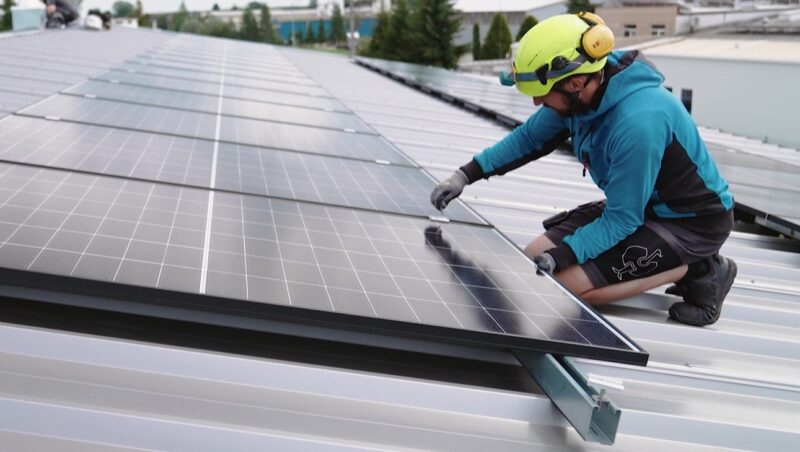Efficient and safe vehicle charging is key to ensuring the comfort of using electric and plug-in hybrid vehicles. With the growing global popularity of such cars, more and more people are considering installing a charging station in their homes. How does an electric vehicle charger work? Which charger is best for an electric vehicle? What benefits does an EV charger offer? Let’s explain.
EV Charger – home charging station for electric vehicles
Installing a home charger for electric vehicles provides convenience for owners of electric and plug-in hybrid vehicles, which have built-in charging systems.
An electric vehicle charger (commonly referred to as an EV charger) allows for quickly charging the vehicle’s battery while it is parked, enabling the user to fully utilize the range of their electric vehicle. For hybrids, it also reduces reliance on the internal combustion engine.
A home EV charger, also known as a wallbox, allows for convenient and efficient charging directly from the home’s electrical power source. It’s an alternative to charging via a standard electrical outlet, which is less efficient and requires significantly more time to fully charge the battery.
How do home EV chargers work?
Home charging stations (electric vehicle chargers) are typically mounted on a garage wall or on a dedicated stand in the driveway. The purpose of wallboxes is to provide optimal charging power for the electric vehicle while ensuring the process is safe and efficient.
An EV charger transfers power from the home’s electrical system to the vehicle’s batteries. Depending on the station model, it can handle alternating current (AC) or direct current (DC) charging.
AC chargers transmit alternating current, which is then converted to direct current by the vehicle’s built-in charging system. These stations are usually cheaper and easier to install, but the charging time is longer compared to DC stations.
DC chargers, on the other hand, transmit direct current directly to the vehicle’s battery, bypassing the vehicle’s charging system. As a result, these devices offer faster charging but are more expensive and require more complex installation.
Which EV charger is right for your vehicle?
An EV charger is an essential piece of infrastructure for the growing number of electric vehicles. These chargers enable owners to drive emission-free while enjoying the convenience and cost savings.
AC chargers are more common for most electric vehicles. They are available in both home versions, known as wallboxes, and commercial versions. Home AC chargers typically range from 3.6 to 22 kW and can operate on single-phase 230V or three-phase 400V systems. Standard maximum current is 16A, though they can handle higher power with overload protection modules.
Wallboxes are usually single-station charging points intended for home use. They are compact and wall-mounted, for example, in a garage or driveway. Depending on the manufacturer, they can be operated via an app. Wallboxes allow for monitoring the charging process using LED indicators and can detect potential issues with the power supply.
The choice of charging station power depends on several factors, such as the vehicle model, the home’s electrical system capacity, and the user’s specific needs. An important aspect for electric vehicles is the capacity of the vehicle’s built-in charging system to accept a certain level of AC power.
If the car is mainly used for short distances, lower power charging may be sufficient.
Before installing an EV charger, a thorough analysis of the home’s electrical system is recommended. It is essential to ensure that the system is strong enough to handle the additional load from charging the electric vehicle.
What are the benefits of a home EV charger?
With a home EV charger, vehicle owners can charge their vehicles quickly and conveniently at any time, without the need to frequently visit public charging stations.
Having a personal EV charger at home allows them to avoid fees at public charging stations and can often reduce the time needed to charge (especially when avoiding waiting for an available charger at a public station). Charging the vehicle at home ensures the owner has full range every day, eliminating concerns about a low battery level.
EV charger prices: how much does a home charger cost?
Prices for private wallboxes – home EV chargers – start at around 2,000 to 3,000 PLN. The relatively low number of public stations, especially in less urbanized areas, makes owning an EV charger almost a necessity for some electric vehicle owners with the appropriate home connection.
Charging using a wallbox can be particularly cost-effective when integrated with a photovoltaic system, enabling the vehicle to be charged using excess solar energy.
Does installing a home EV charging station require a building permit?
Installing a public EV charger is subject to requirements specified in the Act on Electromobility and Alternative Fuels of February 22, 2018, and its later amendments. Additionally, building laws apply, requiring a notice of construction work to the appropriate local authority or county office and the preparation of a situational map.
However, home EV chargers do not require such formalities – you only need to check with your energy provider about the capacity of your home connection. The exception is multi-family residential buildings, where you must obtain permission from the building manager or the community to install the charging station.
Although requirements for home EV chargers are less stringent, it is recommended to consult with local authorities and your electricity provider to ensure the necessary technical conditions. The maximum power of the EV charger should be determined, and depending on the investor’s plans, it may be necessary to increase the contracted power. It’s also important to note that contracted power affects electricity bills – increasing the power will result in additional costs related to charging the electric vehicle.




